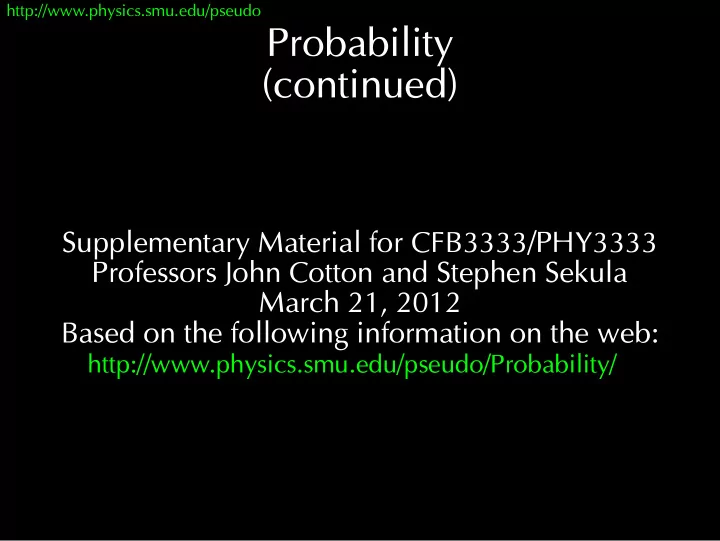

http://www.physics.smu.edu/pseudo Probability (continued) Supplementary Material for CFB3333/PHY3333 Professors John Cotton and Stephen Sekula March 21, 2012 Based on the following information on the web: http://www.physics.smu.edu/pseudo/Probability/
http://www.physics.smu.edu/pseudo The Birthday Paradox ● We act surprised when we find out that somebody we meet at a party has the same birthday as us. ● Let's try it in class. ● We'll start people calling out their birthday (month and day only, please!) one at a time ● Yell “Me too!” if you hear somebody else with your birthday
http://www.physics.smu.edu/pseudo The Telephone Game ● What happens when we base our assumptions on something from “word of mouth”? ● Let's play the Telephone Game!
http://www.physics.smu.edu/pseudo The Telephone Game ● Information has a low probability of surviving word-of-mouth transmission ● Information degradation is a huge problem! ● You can't always base assessments on what you hear.
http://www.physics.smu.edu/pseudo The Telephone Game Story ● Here's what the passage SHOULD have said. “A rock band was playing in a submarine The noise awakened a whale Which ordered a pizza for lunch Anchovies go well with squid.”
http://www.physics.smu.edu/pseudo The Clustering Illusion
http://www.physics.smu.edu/pseudo Simpson's Paradox ● Two or more studies may each reach a common conclusion ● But . . . when combined they reach the opposing conclusion.
http://www.physics.smu.edu/pseudo The non-transitive paradox ● If A is better than B, and B is better than C, how is A related to C? ● C is not necessarily better than A! ● Consider rock, paper, scissors...
http://www.physics.smu.edu/pseudo Extrapolation and Coincidence ● Extrapolation: predicting what happens next in the data based on what has happened before. ● Coincidence: when two unrelated events occur in relation to one another. ● we often assign correlation or causality and neglect that they may just be a coincidence
Recommend
More recommend